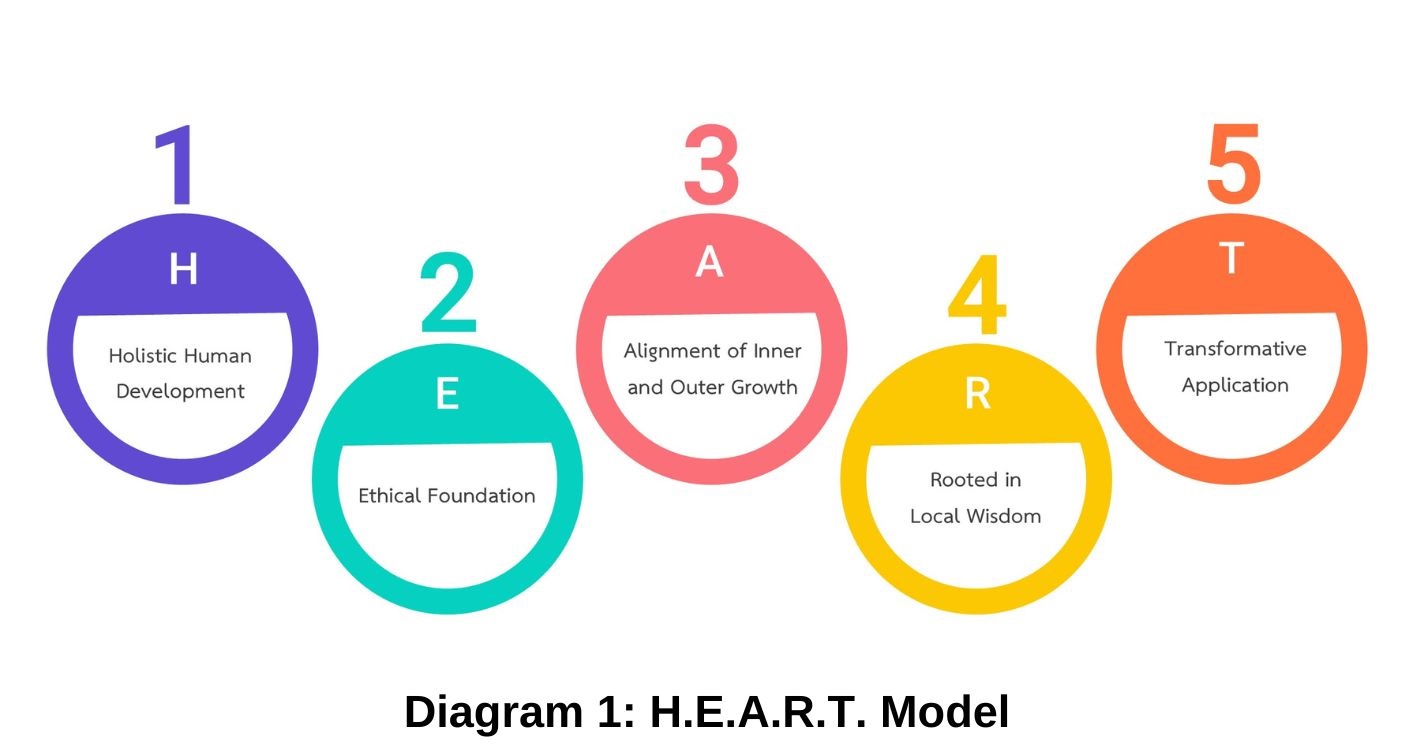A Comparative Study of the Inner Development Goals and the Philosophy of Sufficiency Economy
Keywords:
Inner Development Goals (IDGs), Sufficiency Economy, Philosophical AnalysisAbstract
This research article aims to compare the concepts, similarities, and differences between the Inner Development Goals (IDGs) and the Philosophy of Sufficiency Economy, focusing on both philosophical perspectives and practical applications. The study employs a qualitative research methodology, utilizing philosophical analysis, content interpretation, and comparative conceptual synthesis. Data sources include original canonical texts and academic works from both global and Thai contexts. The findings reveal that both the IDGs and the Philosophy of Sufficiency Economy share a common goal of promoting human development from within, emphasizing inner growth, self-understanding, balanced interpersonal relationships, and the capacity to live ethically and resiliently amidst a changing world. Although the two frameworks differ in their presentation styles and cultural contexts, they share a unified intention to lay the foundations of sustainability on the basis of virtue and inner resilience. The IDGs offer a systematic approach that can be broadly applied in organizational and leadership development, whereas the Philosophy of Sufficiency Economy deeply conveys ethical values through localized contexts. A significant contribution of this study is the development of the H.E.A.R.T. Model, an integrated conceptual framework that combines the IDGs with the Philosophy of Sufficiency Economy. The model comprises H=Holistic Human Development, E=Ethical Foundations, A=Alignment of Inner and Outer Growth, R=Rooting in Local Wisdom, and T=Transformation through Application. This model can be effectively applied to enhance human quality at the individual, organizational, and policy levels toward sustainable development.
References
พระมหาชาตรี เชื้อบุญจันทร์, พงษ์ศักดิ์ เพชรสถิต และปัญญวัฒน์ จุฑามาศ. (2567). แนวทางการจัดการองค์กรคณะสงฆ์ในประเทศไทยภายใต้หลักปรัชญาของเศรษฐกิจพอเพียง. วารสารสถาบันวิจัยพิมลธรรม, 11(2), 1–15.
เมธา หริมเทพาธิป และรวิช ตาแก้ว. (2566). สังคมแห่งการแบ่งปันตามหลักปรัชญาของเศรษฐกิจพอเพียง: การศึกษาเชิงวิเคราะห์ วิจักษ์ และวิธาน. วารสารพุทธมัคค์ ศูนย์วิจัยธรรมศึกษา สำนักเรียนวัดอาวุธวิกสิตาราม, 8(1), 54–65.
เมธา หริมเทพาธิป, ชัยโรจน์ นพเฉลิมโรจน์ และวัชรารัศมิ์ สุนทรวนาเวศ. (2566). ภูมิสังคม: การศึกษาเชิงวิเคราะห์ วิจักษ์ และวิธาน. วารสารวิจัยธรรมศึกษา, 6(2), 64–77.
สุพิชฌาย์ พรพิชณรงค์, พระเทพวชิรโกศล (เทพธีรวงศ์ ไกรวาสไชยวงษ์) และพระธรรมวชิราจารย์ (สุชาติ หวลจิตต์). (2567). การบูรณาการหลักพุทธธรรมและศาสตร์พระราชาเพื่อพัฒนาชุมชนหมู่บ้านเศรษฐกิจพอเพียง. วารสารนวัตกรรมการจัดการศึกษาและการวิจัย, 6(3), 609–622.
สำนักงานคณะกรรมการพิเศษเพื่อประสานงานโครงการอันเนื่องมาจากพระราชดำริ. (2559). หลักการทรงงานในพระบาทสมเด็จพระบรมชนกาธิเบศร มหาภูมิพลอดุลยเดชมหาราช บรมนาถบพิตร. (พิมพ์ครั้งที่ 11). กรุงเทพฯ : สำนักงาน กปร.
ศิริ ถีอาสนา และเสน่ห์ คำสมหมาย. (2560). อภิธานศัพท์: ศาสตร์พระราชา (ในหลวงทรงสอนอะไร). วารสารมหาวิทยาลัยราชภัฏมหาสารคาม, 11(ฉบับพิเศษ), 19–32.
Ankrah, D., Bristow, J., Hires, D.& Henriksson, J. A. (2023). Inner development goals: From inner growth to outer change. Field Actions Science Reports, (25), 82–87.

Downloads
Published
How to Cite
Issue
Section
License
Copyright (c) 2025 Institute of Sufficiency Journal

This work is licensed under a Creative Commons Attribution-NonCommercial-NoDerivatives 4.0 International License.



